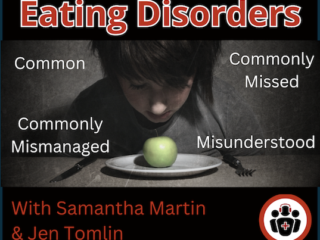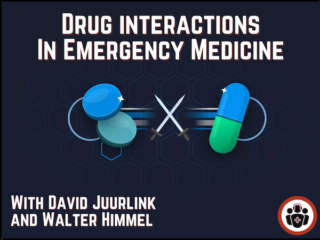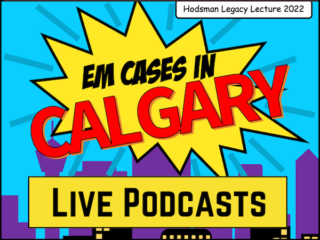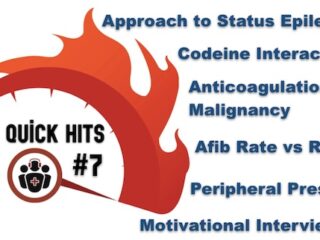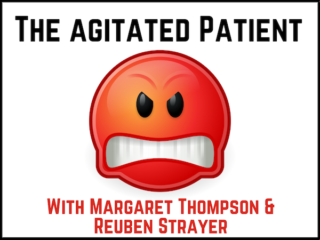Psychiatry
Ep 202 Eating Disorders: Common, Commonly Missed, Mismanaged and Misunderstood
Eating disorders have the highest mortality rate of any psychiatric illness, yet they are frequently missed in the Emergency Department as they can be elusive. Only one in 246 patients who screen positive for an eating disorder at triage have a chief complaint suggesting it. These patients don’t always fit the stereotype—many appear “healthy,” have normal BMI, or present with vague GI, cardiac, or neurological symptoms. Missing the diagnosis has important consequences. The earlier an eating disorder is identified and the earlier that appropriate treatment is initiated the better the long term outcomes. In this episode, with the expertise of Dr. Samantha Martin and Dr. Jennifer Tomlin, we’ll break down the essential clinical clues, screening questions, red flags, and subtle exam findings that can help Emergency Physicians diagnose eating disorders early and initiate treatment to decrease mortality and long term morbidity in these young patients. Eating disorders need to be thought of as both a psychiatric condition and medical condition to optimize the pick up rate and appropriate management. Missing or mismanaging eating disorders in the ED means missing an opportunity to save a life and prevent long term morbidity... Please consider a donation to EM Cases to ensure continued Free Open Access Medical Education here: https://stg-emergencymedicinecases-emcstaging.kinsta.cloud/donation/
Ep 184 Must Know Drug Interactions in Emergency Medicine
We miss potentially dangerous and even lethal drug interactions in EM more often than we realize. In this main episode EM Cases podcast with Dr. David Juurlink and Dr. Walter Himmel we review the common categories of drugs, the high risk patients and the key drug interactions that we need to know about in Emergency Medicine... Please support EM Cases by giving a donation: https://stg-emergencymedicinecases-emcstaging.kinsta.cloud/donation/
Ep 171 Posterior Stroke, EP Lead, HEAR Score, Ketamine for Suicidal Ideation, Peer Support Workers – Highlights from Calgary EM Hodsman Lecture Day
In this special edition main EM Cases podcast episode we feature the highlights from live podcasts recorded at Calgary EM during their annual Hodsman Lecture Day, covering a variety of current EM topics: The challenges of posterior circulation stroke (PCIS); Emergency Physician Lead to improve ED overcrowding, access block and job satisfaction; When not to order a troponin - The HEAR Score; Ketamine to relieve suicidal ideation and reduce acute risk; Peer Support Workers for ED patients with mental health issues and substance use disorder, plus a description of the Pathway to Peers program...
EM Quick Hits 30 Scaphoid Fracture, Therapeutic Hypothermia, HEADS-ED, Pelvic Trauma, Kratom, Femoral Lines
In this month's EM Quick Hits podcast: Arun Sayal on the nuances of assessment for scaphoid fractures, Justin Morgenstern on the evidence for therapeutic hypothermia post-arrest and the TTM2 trial, Sarah Reid on HEADS-ED mental health screening tool for children, youth and young adults, Andrew Petrosoniak on pelvic trauma and pelvic binder tips and pitfalls, Michelle Klaiman on what we need to know about Kratom and Anand Swaminathan on why femoral lines are often a great central line choice...
EM Quick Hits 7 Approach to Status Epilepticus, Codeine Interactions, Anticoagulation in Malignancy, Atrial Fibrillation Rate vs Rhythm Control, Peripheral Vasopressors, Motivational Interviewing
Anand Swaminathan on a simple approach to status epilepticus, David Juurlink on codeine and tramadol interactions: nasty drugs with nastier drug interactions, Brit Long on DOACS in patients with malignancy: which patient's with cancer can be safely prescribed DOACs? Ian Stiell on atrial fibrillation rate vs rhythm control controversy, Justin Morgenstern on peripheral vasopressors: safe or unsafe? Michelle Klaiman, Taryn Lloyd on motivational interviewing that makes a difference to patient's lives...
Ep 115 Emergency Management of the Agitated Patient
Managing acutely agitated patients can cause anxiety in even the most seasoned emergency doctor. These are high risk patients and they are high risk to you and your ED staff. It’s important to understand that agitation or agitated delirium is a cardinal presentation – not a diagnosis. There is pathology lurking beneath - psychiatric, medical, traumatic and toxicological diagnoses driving these patients and we just won’t know which until we can safely calm them down...

